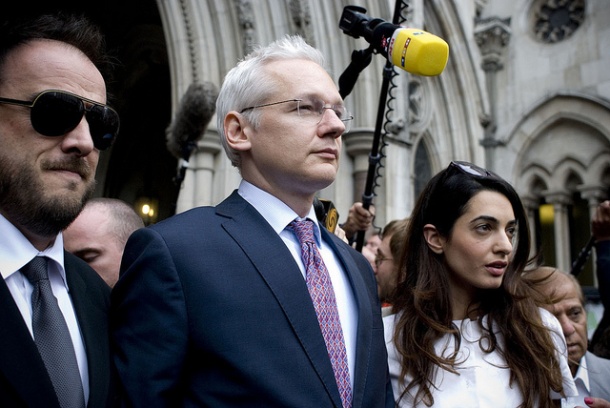Assange seeks asylum in Ecuador after extradition fight fails

Ecuador is considering Julian Assange's request for political asylum after the Wikileaks leader, who is facing extradition to Sweden for questioning over sex crimes, showed up at the country's London embassy on Tuesday.
The anti-secrecy activist had been battling the extradition through the UK courts, but the Supreme Court put an end to that a week ago. He had also appealed to his native Australia for protection against the United States government, but to no avail.

Wikileaks editor Julian Assange (pictured in July 2011) is seeking asylum with the Ecuadorian government. Photo credit: acidpolly/Flickr
"The Government of Ecuador is evaluating the request of Mr Julian Assange and any decision on it will take into account respect for the rules and principles of the International Law and the traditional policy of Ecuador to safeguard human rights," a statement read.
Assange has not been charged by the Swedes, but the authorities there want to talk to him over allegations made by two former Wikileaks volunteers, who have accused him of sexual coercion.
The Wikileaks leader, who has exposed among other things troves of US diplomatic cables and sensitive military information, fears Sweden's extradition arrangements with the US will see him sent there for trial. He was quoted in the Ecuadorian foreign ministry's statement as saying Australia had refused to protect him, even though he was being "persecuted politically".
"Such statements make it impossible for me to return to my home country and puts me in a state of helplessness by being requested to be interrogated by the Kingdom of Sweden, where its top officials have openly attacked me, and investigated me for political crimes in the United States of America, a country where the death penalty for such offenses is still in force," Assange was quoted as saying.
Australian prime minister Julia Gillard has previously said that the leaks Assange facilitated were legal, but "grossly irresponsible". Assange, currently serving as talk show host for the Kremlin-funded RT news channel despite being under house arrest in the UK, responded by saying he would run for the Australian Senate himself and put another candidate up to take Gillard on in her own constituency.
Assange is arguably not entirely out of legal options in his fight against extradition. He could still appeal to the European Court of Human Rights (ECHR), and UK extradition proceedings will only kick off if he fails to do so by 28 June. The Swedes have also pointed out that the ECHR could intervene in an extradition from Sweden to the US, if it could be shown that Assange would face an unfair trial in the US.
Ecuador, which itself has extradition arrangements with both the EU and US, had offered Assange residency before, in 2010. However, the BBC reported on Wednesday that this offer had only been available briefly, as it was made by a deputy foreign minister and was subsequently scrapped by the Ecuadorian president.